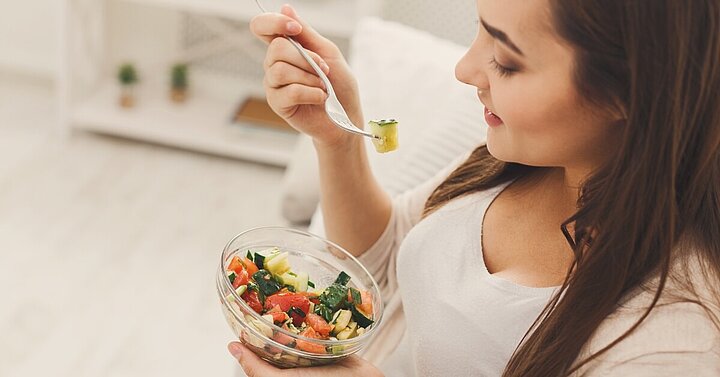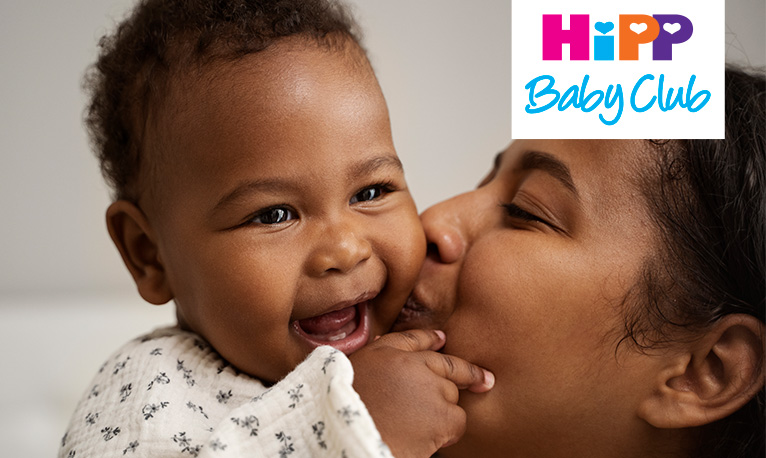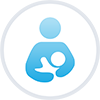What to eat in the third trimester
Pregnancy | | Helen Farnsworth
In the third trimester, you can finally add calories to the standard daily intake (around 2000 kcal per day for an average healthy woman). However, at approximately 200 kcal a day, the increase isn’t much – and it’s certainly not eating for two.
Of course, you still need to maintain a healthy balanced diet throughout the third trimester, as you have been doing up until now, so what might that extra 200 kcal look like?
An extra 200kcal is about the same as:
- 2 slices of wholegrain bread with vegetable oil spread
- 2 medium sized bananas
- 1 large egg with a slice of wholegrain bread to dip (Only British Lion stamped eggs are safe to eat with a runny yolk when pregnant)
- 2 x 125g pots of low fat yoghurt
As a reminder, continue trying to follow the advice of the Government’s Eatwell guide. Remember, there’s no need to balance every meal you eat, as long as you aim for balance throughout your day and across the week.
Foods to avoid
There is no change to the guidance of which foods you should avoid in your third trimester, but you should continue to follow the advice.
Fish to avoid:
- Eat no more than two portions of oily fish a week, such as salmon, trout, mackerel and herring.
- Eat no more than two tuna steaks (about 140g cooked or 170g raw) or four medium-size cans of tuna (about 140g when drained) per week
- Avoid raw fish, shellfish, raw fish in sushi
- Be cautious with smoked fish that isn’t thoroughly cooked
- Avoid including shark, swordfish and marlin
Meat products to avoid
- Raw or undercooked meat
- All liver and liver products
- All types of pâté, including vegetarian pâté, due to their Vitamin A content
- Game meats such as goose, partridge or pheasant, as they may contain lead shots
Eggs to avoid
- Raw or partially cooked duck, goose or quail eggs
- Raw or partially cooked hen eggs that are not British Lion/don’t have a lion stamp on them. (British Lion stamped eggs are safe to eat raw or partially cooked, as they are less likely to have salmonella).
Dairy foods to avoid:
- Foods made from unpasteurised milk, e.g. soft ripened goats’ cheese
- Pasteurised or unpasteurised mould-ripened soft cheeses with a white coating on the outside, such as Brie, Camembert and chèvre (unless cooked until steaming hot)
- Pasteurised or unpasteurised soft blue cheeses, such as Danish blue, Gorgonzola and Roquefort (unless cooked until steaming hot)
- Unpasteurised cows' milk, goats' milk, sheep's milk or cream
Caffeine
Caffeine intake should be limited to no more than 200mg per day. It’s not just coffee that contains caffeine; it’s also found in other everyday food and drinks.
Levels found in some typically caffeinated food and drinks are:
- 100mg in a mug of instant coffee
- 140mg in a mug of filter coffee
- 75mg in a mug of tea (green tea can have the same amount of caffeine as regular tea)
- 40mg in a can of cola
- 80mg in a 250ml can of energy drink
- Less than 25mg in a 50g bar of plain dark chocolate
- Less than 10mg in a 50g bar of plain milk chocolate
Alcohol
NHS advice on alcohol is that the safest approach is to not drink alcohol at all during pregnancy. This keeps risks to your baby to a minimum.
Further advice on other food and drinks to avoid in pregnancy from the NHS:
Avoid liquorice root
Drink no more than 4 cups of herbal tea a day
Thoroughly wash all fruit/vegetables/salad before eating
Only avoid eating peanuts if advised to do so by a healthcare professional
Avoid supplements containing vitamin A
For further details, refer to the NHS website
Pregnancy supplements in the final trimester
You don’t need to carry on taking folic acid supplements after week 12 of pregnancy, unless you have been advised otherwise, but still continue with your daily vitamin D supplement, and pregnancy multivitamin if you’ve chosen to take one. Any supplements should be free from vitamin A
Nutrition during pregnancy
All the advice around what to eat and foods to avoid during pregnancy can be daunting. Try not to worry, and just remember that the occasional treat is absolutely fine, so long as you’re generally eating a healthy balanced diet.


